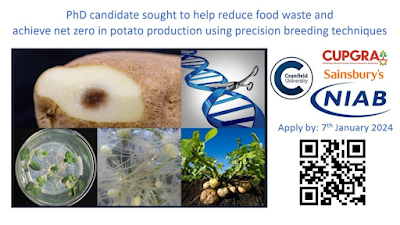PhD Opportunity Alert!
OBJECTIVES AND APPROACHES
1) Identify genes involved in bruising, via RNAseq in areas mechanically bruised and identified through literature, to compare between varieties and contrasting types of bruising (pressure vs. impact). In order to produce bruised potatoes, parallel plate compression (Instron) and an instrumented pendulum will be used. We will identify up to four candidate genes to understand their role in bruise resilience.
2) Modify the chosen genes and proof of concept of how gene-editing could increase bruise resilience in potatoes. We will use CRISPR Cas gene-editing to produce up to three new lines for each gene target with different mutations in ‘Maris Piper’ potatoes (or other agreed cultivar). We will target different aspects of bruise resilience, i.e. skin, membrane, and cell wall components, and bulk potatoes for potential storage trials against control.
3) Compare the cellular structure of both parent and gene-edited tuber to better understand how the loss of the candidate genes help achieve bruise resilience. Tissues will be examined via confocal microscopy coupled with image analysis. Bruised tissue physiology (e.g. phenolic content) and geometry will also be investigated.
4) Study effects of the modification on wider potato characteristics, with regard to potato quality and meeting industry and consumer needs. The evaluation process will be developed collaboratively with industry partners, with storage trials looking at e.g. dry matter, respiration, sugars and texture after storage and cooking. Respiration is indicative of overall tuber metabolic rates especially regarding starch to sugar conversion.
PRIMARY LOCATION OF THIS PHD
The student will be registered with Cranfield University, Cranfield, Beds., and work and study part of the time here. The other part of time the student will work at NIAB, Cambridge, Cambs., or on placement organised by CUPGRA.
TRAINING
Working with researchers the student will develop skills in horticulture, postharvest biology and technology, advanced breeding techniques (CRISPR) at NIAB, microscopy and data analysis. The student will also work with CUPGRA and Sainsbury’s providing a strong connection to industry, gaining insight into retail and consumer need around sustainable and resilient food production. There will be networking opportunities at NIAB and CUPGRA stakeholder events.
The student will have access to modules such as Quality of Food and Beverages, Postharvest Technology, Next Generation Sequencing Bioinformatics, Machine Learning for Metabolomics, and Genome Assembly at Cranfield University. These modules will contribute to the student’s understanding of the existing knowledge gaps in plant biology and current limitations the potato industry is facing.
Students will have access to training in key bioscience areas (bioinformatics, statistics and mathematics) to enhance employability and research capability.
The CTP – SAI (https://www.ctp-sai.org) is a groundbreaking partnership between leading businesses, charities and research providers offering outstanding training for the agri-food sector
All CTP-SAI students will receive the Leadership and Management training provided by MDS (www.mds-ltd.co.uk) and will create their Personal Development Plan (PDP) to identify their development needs and areas of strength. Each student will receive individual coaching and mentoring with regards to their career plans and skills development (in addition to the scientific project supervision).
INDUSTRIAL PLACEMENT
Placements are a key feature of CTP and UKRI-BBSRC expects all doctoral candidates on a CTP programme to undertake a placement. Placements can be in the form of research placements (3-18 months duration) or used more flexibly for experiential learning of professional skills for business and/or entrepreneurship. All placements are developed in collaboration between the partners with input from the doctoral candidate.
APPLICATION AND ELIGIBILITY
Contact Dr Sandra Landahl s.landahl@cranfield.ac.uk for an informal discussion on the research content of this PhD.
This studentship will begin in October 2024. The successful candidate should have (or expect to have) an Honours Degree (or equivalent) with a minimum of 2.1 in Plant Science, Applied Statistics, or other related science subjects. Students with an appropriate Masters degree are particularly encouraged to apply.
We welcome UK, EU, and international applicants. Candidates whose first language is not English must provide evidence that their English language is sufficient to meet the specific demands of their study. Candidates should check the requirements for each host organization they are applying to, but IELTS 6.5 (with no component below 6.0) or equivalent is usually the minimum standard.
This studentship is for four years and is fully funded in line with UKRI-BBSRC standard rates. These were for 2023/24, an annual maintenance stipend of £18,622, fee support of £4,596, a research training support grant of £5,000 and conference and UK fieldwork expenses of £300.
To be classed as a home student, candidates must meet the following criteria:
Be a UK National (meeting residency requirements), or
Have settled status, or
Have pre-settled status (meeting residency requirements), or
Have indefinite leave to remain or enter
If a candidate does not meet the criteria above, they would be classed as an international student and must demonstrate the ability to meet the supplement in fees required for an international student.
Anyone interested should complete the online application form before the deadline of 7th January 2024. Interviews will be held during January 2024.
Please contact recruitment-ctp-sai@niab.com for further application details.








0 Comments